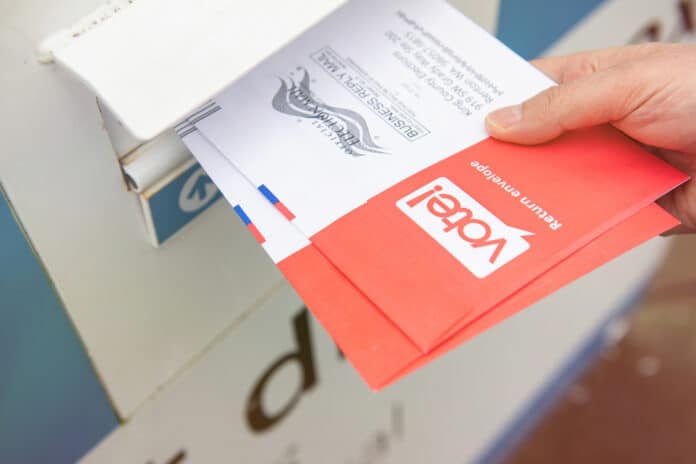(The Daily Signal) — The primary election season is about to start, and the country is just 10 months away from the general election, which will determine control of the White House, Congress, and state and local offices.
With the increased use of mail-in ballots and early voting, voters will be returning their ballots weeks, if not months, before the traditional November election day.
And since much has changed about the way Americans vote, it’s more important than ever that measures be implemented that inspire confidence in the fair and impartial administration of our elections.
To best assess and compare the laws affecting election administration, The Heritage Foundation has released a revised Election Integrity Scorecard as of January 2024 that outlines the best practices for running secure elections. (The Daily Signal is the news outlet of The Heritage Foundation.)
In 2021, The Heritage Foundation began tracking the laws of every state (and the District of Columbia) governing the conduct of elections — local, state, and federal — and ranking them in its Election Integrity Scorecard.
State performance was based on 48 best-practices criteria and scored on a 100-point scale. After three years of reviewing laws and corresponding with state election officials, most of the original concerns remained evergreen, but a few new problems arose.
To keep abreast of the latest challenges affecting election integrity, we have amended one of our best practices and added two new ones.
The amendment addresses interstate agreements to share voter registration information. These agreements are indispensable to prevent voters from illegally voting in more than one state.
Since the demise of the Kansas-Missouri Interstate Crosscheck Program in 2017, the Electronic Registration Information Center has been the only organized means for states to share voter registration information. Thus, the scorecard previously asked only whether states were members of ERIC or not.
Since 2022, several member states have left ERIC because ERIC has steadfastly refused to address some legitimate concerns that they have raised, such as ERIC’s history of sharing state data with third-party, partisan organizations.
The Heritage Foundation outlined many of these problems with the ERIC program in an April 2023 analysis, “Maintaining Accurate Voter Registration Rolls: The Need to Rehabilitate the ERIC Program or Form an Alternative.”
Accordingly, the scorecard now credits not only ERIC member states, but also those states that have finalized agreements with other states outside the ERIC network to share voter registration information.
One point is awarded for a single agreement; two points are awarded for agreements with four or more states, thus encouraging the development of alternatives to ERIC and rewarding states that enter into multiple agreements, increasing the robustness of their systems.
As of this writing, nine states have agreements with at least one other state; four states (Alabama, Florida, Georgia, and Virginia) have already concluded agreements with four or more states. More are expected this year.
We have added a new best practice to the scorecard this year: election audits.
Annual audits performed by outside experts are the long-standing (often legally obligatory) norm for the whole spectrum of public and nonprofit entities. Yet the administration of elections has been largely immune to this sort of thoroughgoing oversight.
States can address this and should require comprehensive audits, as outlined in another Heritage analysis, “Best Practices and Standards for Election Audits.”
The revised scorecard asks whether states perform postelection tabulation audits to ensure that votes were counted correctly. As of now, 46 states plus the District of Columbia perform some type of tabulation audit after their elections. A second audit criterion checks whether officials audit compliance with state “procedures and processes, or an effective portion of them, to verify that state and federal election laws and regulations were followed, including those requiring maintenance of an accurate voter registration list.” Only 11 states perform such audits with any frequency.
The second new best practice that we have added concerns whether or not a state or any of its political subdivisions use ranked choice voting.
This confusing process — in which voters make multiple candidate selections and officials then perform multiple tiered rounds of ballot counting, making voting and the administration of an election much harder — was scarcely used at any level of government until roughly 10 years ago, when it became the fascination of certain left-wing elements.
In practice, as explained in a 2019 Heritage study, “Ranked Choice Voting Is a Bad Choice,” ranked choice voting has been opaque and error-prone. Its adoption creates additional operational challenges for election administrators who have hardly been infallible running traditional elections.
Ranked choice voting’s supposed democracy-enhancing qualities have yet to materialize anywhere outside of its proponents’ websites.
The revised scorecard gives one point to any state, 32 in all, where no ranked choice voting occurs at the state or local level. A formal statutory ban is ideal, but not necessary. However, no credit was given if any locality in the state uses ranked choice voting.
So, while only Alaska and Maine have adopted ranked choice voting at the statewide level, many states failed to earn the point because political subdivisions — often major metropolitan areas like Seattle, Minneapolis, and New York City — unwisely use ranked choice voting.
So, how did the states do?
The good news is that many states worked assiduously throughout 2023 to address the best practices criteria in the scorecard.
As of January 2023, the top performing states were Tennessee (88), Georgia (84), Missouri (83), Alabama (82), and South Carolina (79). As of the beginning of this year, the top performing states (using the slightly revised criteria) are Tennessee (90), Georgia (83), Oklahoma (82), Florida (81), and South Carolina (81).
Among the top overall performers, Oklahoma was the biggest mover, earning seven additional points and climbing seven spots in the rankings.
Further down the list, even bigger moves occurred, none more dramatic than Nebraska’s vault of 23 points and 12 places in the overall rankings, driven by the Cornhusker State’s adoption of new voter ID laws.
Elsewhere, North Carolina improved nine points and moved up six places, while both Indiana and Ohio improved by eight points and moved up five places.
On a less positive note, a number of states went in the wrong direction, but the point swings tended to be less dramatic. Minnesota is the outlier here, losing six points and falling eight places due to that state’s adoption of automatic voter registration and a permanent absentee-ballot list, both of which — as the scorecard explains — decrease the security of the election process.
This year, 2024, seems poised to be a momentous year for the election process. State legislatures, many just now beginning their annual sessions, still have an opportunity to take up further legislative reforms that bring confidence, transparency, and fairness to the administration of elections.
Their constituents deserve no less.

















